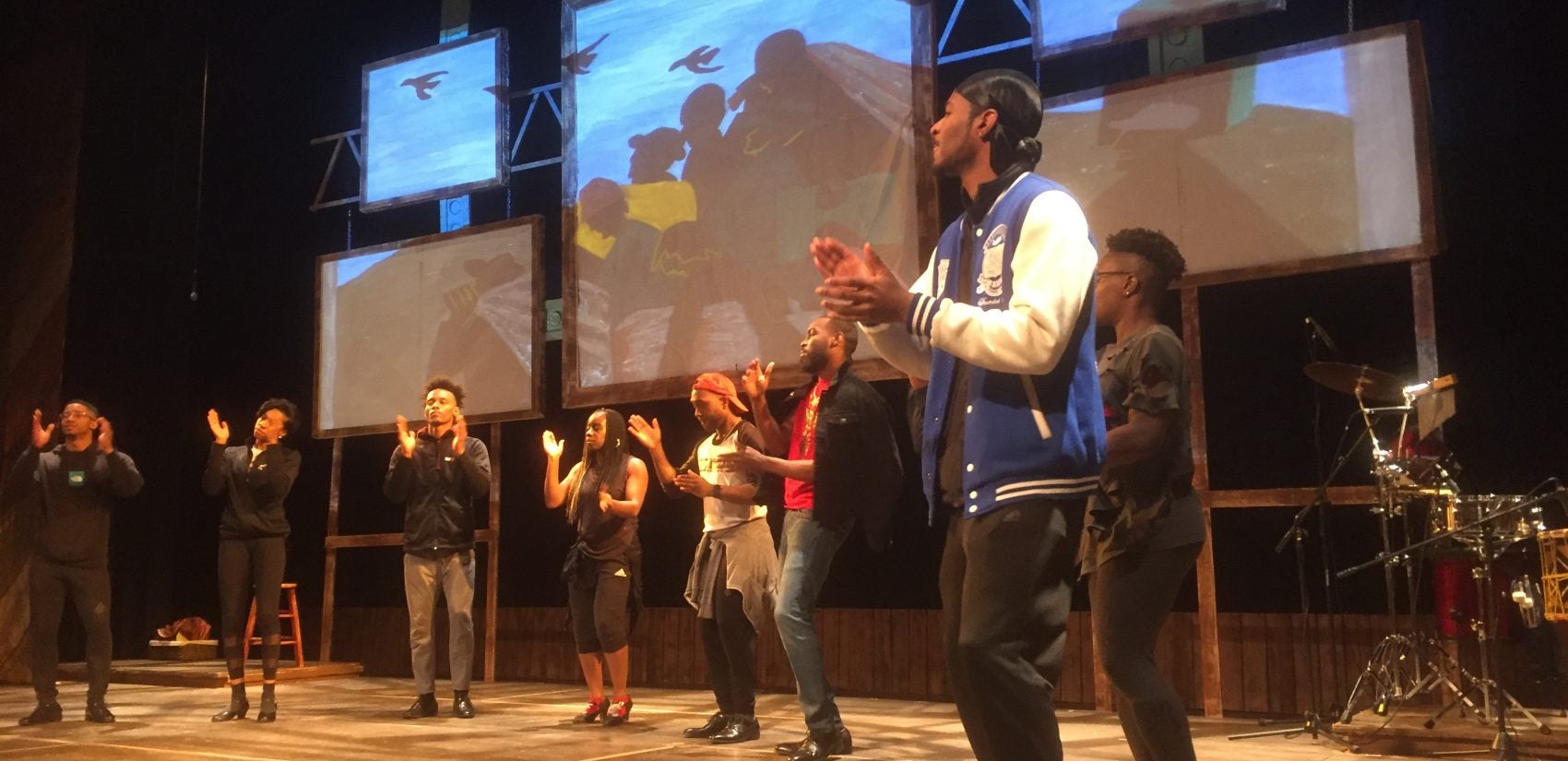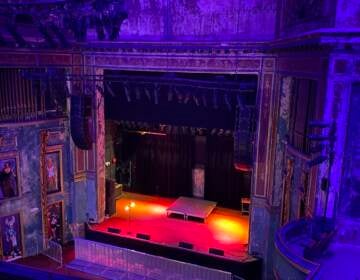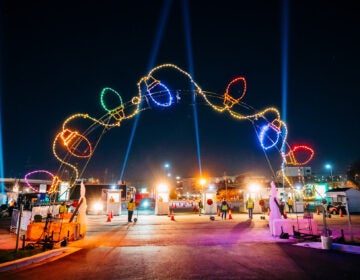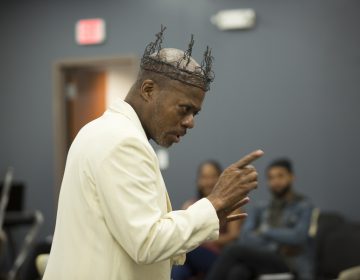Step Afrika! tells Great Migration story through dance
With stomping feet, clapping hands and spoken word, the Step Afrika! dance company is in Wilmington this week to tell the story of the Great Migration.
As the theater doors of the Grand Opera House in Wilmington open, the sounds of stomping feet, clapping hands and spoken word dances down the aisles.
The soulful moan of the saxophone embraces the rhythmic music emanating out of bodies moving in unison.
Iconic artwork of African American figures hauling baggage as they search for the beginning of a new life creates the backdrop for the storytellers on stage.
The storytellers are members of the touring company Step Afrika!, who rehearsed on Wednesday afternoon for its production “The Migration: Reflections on Jacob Lawrence.”
On Friday night only, at the Grand Opera House in Wilmington, the 24-year-old company will use the art of stepping to depict artist Jacob Lawrence’s The Migration Series, which portrays the Great Migration of African Americans from the rural south to cities in the North, Midwest and West between World War I and World War II.
Prior to the 1900s, 90 percent of African Americans lived in the Deep South, according to historians. The Great Migration, depicted in Lawrence’s 60-panel series, transformed the demographics of the United States, and the lives of African Americans searching for freedom and job opportunities.
“It changed our cities, it changed our culture, it influenced the birth of other cultural forms. America started to become a different place when African Americans began to move all over and not be limited in their movement to the south,” said Step Afrika! founder C. Brian Williams.
“It’s also centered around a topic that’s very relevant right now—this issue of migration, and immigrants and migrants. When I looked at the paintings of Jacob Lawrence it looked an awful lot like the photographs of people coming on Ellis Island from Europe in the 1900s, it looked an awful lot like our southern neighbors moving across the border and making that journey from El Salvador, Honduras and Mexico to [America], and definitely that massive migration happening out of Syria.”
Every American is connected to the issue of migration, Williams said.
“We want people, when they see the production, to reflect on who is a migrant, and when you see others in transition, in motion, in movement, we shouldn’t judge so quickly,” he said. “When I think of the African Americans who left the South in the 1900s, they were brave to make these moves to places they didn’t know where they were going in hopes of a better life, and I think we can all connect to that.”
The 100-year-old tradition of stepping began when African Americans first attended colleges in the United States. Black students who were members of sororities and fraternities used their hands, feet and voices to make music as a way to express pride in their organizations.
Step Afrika! is the first professional company in the world dedicated to stepping. The 16-member group based in Washington, D.C. aims to take the culturally rich, folkloric mode of expression and mold it for the stage. The company strives to preserve the tradition and stay true to its origins, while also pushing the art form forward.
“For a long time we who practice the tradition of stepping didn’t really consider it a dance form. We would almost resent the fact someone would try to call what we were doing dance,” Williams said.
“But we have tried to bring stepping into the world of dance. It is a high energy, full body, percussive dance form that has interesting origins in African American culture — but what I really like about stepping is it requires participation from the audience. So, whenever Step Afrika! performs, we’re always working with the audience to make music with us. We don’t want the audience to sit still and be quiet. The tradition of stepping requires audience involvement and participation, and Step Afrika! stays true to that.”
The company travels all over the world, introducing the art form to as many people as possible.
“We were in Vietnam performing in these old opera houses, and they would be packed and the response would be strong. We would always go there and they would say, ‘Don’t expect the people to be responsive, they’re very reserved,’ then the next thing you know we’re in the performance and they’re screaming and hanging out with us like they know the tradition very well,” Williams said. “That to me shows the arts can cross all barriers.”

“The Migration,” the company’s largest production to date, incorporates live drumming, jazz and gospel music, and contemporary and jazz dance with the body percussion of stepping. The show even integrates traditional West African rhythms connected to rituals. The music blends with the tapestry backdrop of the Lawrence paintings.
During the creative process, director Jakari Sherman researched both the Great Migration and Lawrence’s work to tell the story through music, dance and visual art.
“The aim was not so much to tell my own version of the migration story, but to try to connect as much as I could to the way in which Jacob Lawrence told that story. I feel like we were able to capture his work. We were able to capture the mood of his work, the color palette, and the way he characterized people at that time, so I think we were able to do through movement what he was able to do through painting,” he said.
“The beautiful thing about it has not only been what we’ve done on the stage, but the connections we’ve made to audiences and people who come to us to tell us about their own family’s migration story.”
Performer Dionne Eleby, a ten-year member of the company, said she instantly connected with the concept of the show, as her father’s family migrated from Mississippi to Milwaukee, Wisconsin. She said she also tried to use her own personal experience to emote the story on stage.
“I think everyone has a migration, whether you move from a city to another city or a country to another country,” Eleby said. “Life is a migration, so the trials and tribulations I’ve gone through, for instance being the only African American theater person in my college, so that was a journey in and of itself. So I think about what I’ve been going through and how I can bring that to the stage.”
The performance is presented by the Delaware Art Museum in partnership with the Grand Opera House, Delaware State University, Christina Cultural Arts Center and the Delaware Institute for the Arts in Education.
Community engagement and outreach is also a significant aspect of the company’s initiative. While in Delaware, the partnership with the art museum has allowed the performers to perform and teach school children about stepping. They also will lecture at Delaware State University.
“For us, our arts education programs focus on teamwork, commitment and discipline, and we always stress those ideas whenever we get in front of children,” Williams said. “I love the energy the students give the artists.”
Performer Joe Murchison, who has been with the company for eight seasons, said he hopes the students and the audience will learn something new.
“It’s so emotionally driven, and it tells a story and it’s a real story. It was a history lesson for myself, honestly,” Murchison said.
“I didn’t learn about the Great Migration in school, and sadly, this is my first time being exposed to it, so hopefully someone else out there who didn’t know about the migration will walk away feeling inspired and more knowledgeable about history.”
Tickets are still available for Friday’s show, which begins at 8 p.m.
WHYY is your source for fact-based, in-depth journalism and information. As a nonprofit organization, we rely on financial support from readers like you. Please give today.





